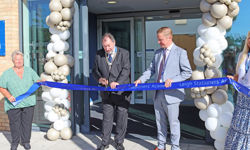As reported by the Newspaper Society: Speaking at the Society of Editors Freedom to Inform conference, Mr Murray highlighted the importance of press freedom to the work of regional and local newspapers which often expose issues of national importance through local reporting.
Mr Murray said: “It is fitting then that at a time a free press, and with it our free media and a free speech in general, are under attack in such a determined way, that the Society of Editors is able to remind politicians and the public that the battle does not engage just a handful of national titles, but all of the press.
“So often work at a grassroots level is elevated to national debate,” he added. “Such tenacious investigations as the Liverpool Echo's marvellous work to explore the truth behind the Hillsborough Disaster springs to mind, along with so many other campaigns the length and breadth of the country.”
"It is timely to remind those who see the Press, the media even, as just the national papers, that in the Shires – and the cities, towns and villages - we still play a vital and influential role. Certainly the 31 million people who read a local news paper each week or the 62 million unique visitors who log on to a regional newspaper website each month understand the role we play.
“It is after all the journalists from the regional press, some 10,000 of us, who police local democracy, sit in council chambers, attend inquests, hold police and health services to account and provide a real voice for the average man and woman in our communities.
“I have lost no opportunity of late to explain that a free press is just as important to the people, of Manchester and Glasgow, Cardiff and Belfast, Southampton and, yes, even Portsmouth, as it is for those who walk the streets and corridors of Westminster.
“We in the newsroom of the Southern Daily Echo need to be free of political interference, threat and influence every bit as much as our colleagues in the newsrooms of the Telegraph and the Observer or even the BBC and ITN if we are to fulfil our roles.
“Attempts to split the regional press from the national titles during the recent debates over regulation have failed; even if we do not always see eye to eye on some issues. But when the big issues of free speech and an independent press are at stake, we stand together.
"A free and independent press is a jewel in any nation's crown. Oh it may be a diamond in the rough and even when polished will have visible flaws, but it is still far too precious a thing to discard.”
The conference heard from a host of speakers including Lord Grade who delivered the Society of Editors lecture. He railed against the politicians’ Royal Charter for press regulation describing the process as “bonkers” and “unnecessary” and giving his endorsement to IPSO, urging politicians to get behind it.
Home Secretary Theresa May used the keynote address to attack the BBC for its negative impact upon local newspapers through its provision of local news through websites funded by the licence fee. She said: “It is destroying local newspapers and it could eventually happen to national newspapers as well. This is as dangerous for local politics as it is for local journalism.
“I have had a number of conversations with both the editor and managing Director of my main local newspaper, the Maidenhead Advertiser, about the impact of the BBC locally and the importance of keeping an alternative local news source.
“This is a debate that won’t go away and I believe that the BBC has to think carefully about its presence locally and the impact that has on local democracy.”
The conference also heard from speakers including Trinity Mirror chief executive Simon Fox and KM Group chairman Geraldine Allinson.










